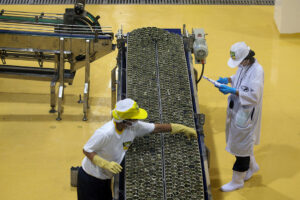FACTORY OUTPUT declined in November by 4.2% year on year, with the indicator dragged down by consecutive typhoons, the Philippine Statistics Authority (PSA) reported on Tuesday.
According to preliminary results from the PSA’s Monthly Integrated Survey of Selected Industries, factory production, as measured by the volume of production index (VoPI), the November reading reversed a gain of a revised 0.7% in October and a 2.1% rise a year earlier.
The November reading was the weakest since the 5.1% contraction in September.
Month on month, the manufacturing sector’s VoPI fell 1.9%, deepening a 0.4% drop in October. Stripping out seasonality, factory output fell 1.9% in November from a 5.5% rise a month earlier.
Manufacturing output growth for the first 11 months averaged 1.1%, against 5.1% a year earlier.
The forward-looking indicators, on the other hand, are pointing to a recovery. The Philippine manufacturing purchasing managers’ index (PMI) compiled by S&P Global rose to 53.8 in November from 52.9 in October, the strongest reading since the 54.1 posted in May 2022.
PMIs are a gauge of the volume of raw material orders, which will be turned into manufactured goods later. The strength of purchasing is a proxy for how manufacturers forecast demand in the near future. A PMI reading below 50 points to a contraction in the manufacturing activity, while expansions are signaled by PMIs above 50.
“The supply chain disruptions as a result of adverse weather conditions, leading to port congestion and flooding and eventually to longer lead times for inputs,” Leonardo A. Lanzona, an economics professor at the Ateneo de Manila, said via Messenger.
Mr. Lanzona also said that inflationary pressures were present in November, raising input costs for manufacturers.
Inflation accelerated to 2.5% in November, as prices of vegetables, meat and fish rose after six typhoons entered the Philippine Area of Responsibility throughout the month.
Sergio R. Ortiz-Luis, Jr., president of the Philippine Exporters Confederation, Inc., said by telephone that disruptions in the global supply chain caused by geopolitical tensions have also affected the electronics industry.
The PSA said that the November decline was led by food manufacturing, which contracted 0.8%. Food products account for 18.7% of manufacturing activity.
The manufacture of transport equipment fell 0.4%, and the manufacture of computer, electronic and optical declined 5.6%.
Average capacity utilization rate was 75.6% in November, topping the 74.8% from November 2023. The October reading was a revised 75.8%.
Nineteen out of 22 industry categories posted average capacity utilization rates of more than 70%. — Pierce Oel A. Montalvo
